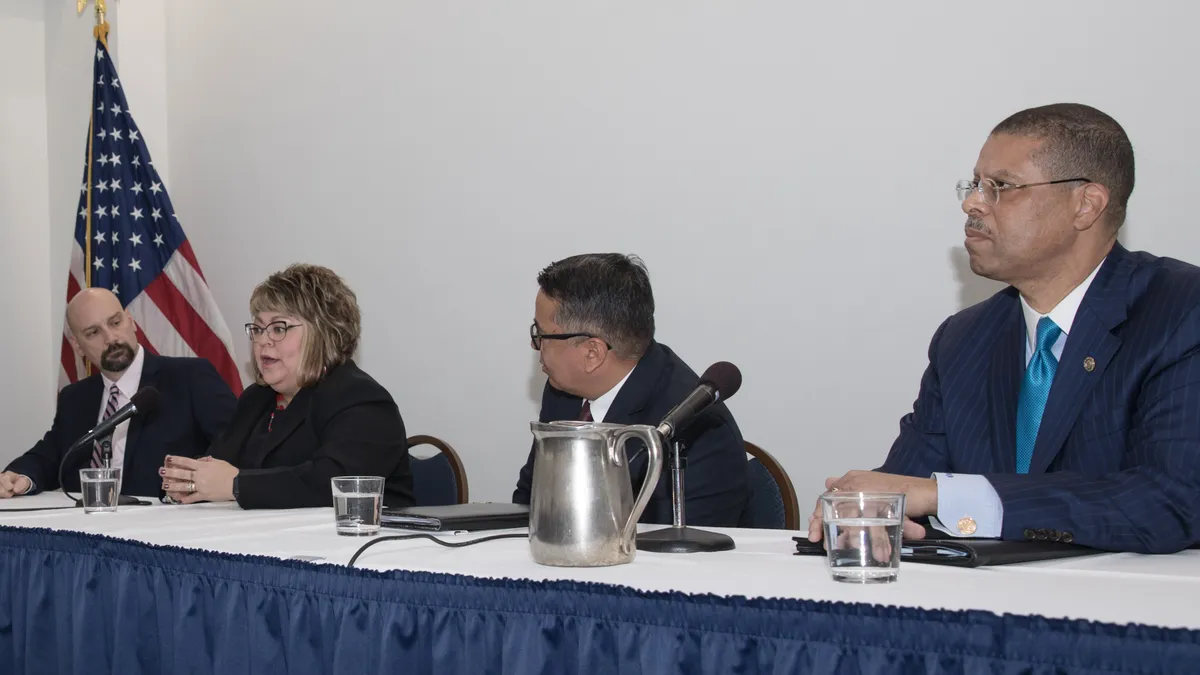Four superintendents from across the nation addressed a small room packed with education leaders Thursday afternoon, answering questions on everything from equity and access to the role of civics education in democracy.
The discussion was part of the annual Superintendent of the Year selection process for AASA, The School Superintendents Association. This year, the panel brought together finalists Gustavo Balderas from Eugene School District in Oregon, Samantha Fuhrey from Newton County School System in Georgia, Michael Nagler from Mineola Union Free School District in New York, and Jeffery Smith from Hampton City Schools in Virginia.
Here’s what they had to say on big-picture issues.
The future is "a school without walls"
It’s more important than ever to engage all students and families and ensure opportunity, the four finalists agreed. Balderas says his “No. 1 concern” has been offering more wraparound services as a “safety net” for his community and to address the trauma students from marginalized communities carry.
But it’s one thing to have policies and practices in place and another to focus on specific measurable outcomes, Smith said. In his district, a “robust” real-time data system on student achievement allows administrators to make well-informed decisions around where to deploy resources. He also stressed the importance of having a guaranteed viable curriculum accessible to and practical for all teachers, rather than one only available “in pockets.”
Offering dual enrollment opportunities and different career pathways for high-wage and high-demand jobs can also give otherwise marginalized students a leg-up in the workforce. Balderas agreed, saying, “The future of education is a school without walls. Kids are going to have blended learning, different pathways, dual languages and credit opportunities.”
In Smith’s district, there are over 450 industry leaders at the table who “are helping to reshape the curriculum,” and provide mentorship, internship and externship opportunities for students and teachers, he said.
But, Balderas pointed out that equity and access needs to begin at the elementary school level and that district leaders should address barriers and lay a solid foundation for future success.
In Fuhrey’s district, the barrier was a poverty rate of over 71%. She stressed involving community partners to meet students' needs as well addressing implicit biases.
“We’re working on moving toward being poverty-aware, and moving away from the idea that people in poverty are not hard workers,” Fuhrey said.
A NCLB "hangover"
The Every Student Succeeds Act missed the mark, the four superintendents agreed — partially because lawmakers haven’t taken full advantage of the law, but also because many leaders are still recovering from the high-stakes mindset created by No Child Left Behind and exacerbated by ESSA.
“We have this hangover from NCLB that’s going to be present for some time,” Balderas said, saying the sense of competition has “pit people against each other.” Instead of competing, Nagler said, districts should share their resources to uplift communities.
And competing to become college and career-ready shouldn’t be the only focus of a public education either, panelists agreed, with life readiness, long-term success, and civic engagement among equally important priorities. “[Education] has turned into creating a workforce,” Nagler said, “but the original purpose was to make citizens of the democracy.”
Teachers are often fearful of approaching controversial civics topics that could be valuable teaching moments, and Fuhrey noted this hesitancy needs to be addressed.
A "revolving door" of teachers
Teacher shortages made their way into the conversation, with Fuhrey even noting equity and access cannot be addressed without first closing the ever-revolving door of teachers some districts struggle with. “It makes it really hard to have a conversation about achievement because that looks different than in the system that has little turnover numbers,” she said.
Smith and Balderas both pushed for teacher induction programs to rekindle interest in the profession, and Smith added compensation also plays a big role in the equation.
Because a diminishing number of candidates are expressing interest in the profession and more candidates are coming into the classroom without teaching experience, Fuhrey noted her district has had to redirect its resources to provide training on everything from lesson planning to classroom management.
To attract more qualified candidates to the profession, Nagler said, “a little more respect would go a long way.”
“The education community is a very powerful community and I don’t think we leverage that enough,” Fuhrey said. “I think we sit back and let the world happen to us.”
But that is changing, panelists agreed, with leaders slowly realizing it is more valuable to innovate together instead of independently and in competition with one another.






















